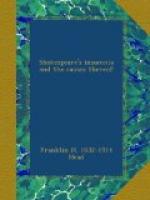Richard III. says, when the catalogue of his crimes is full, and when he “sees as in a map the end of all":—
“The sons of Edward sleep in Abraham’s
bosom,
And Anne, my queen, hath bid the world
good night.”
In addition to the fuller phrases wherein are shown the blessedness of sleep, or the remediless nature of its loss, many brief sentences occur scattered throughout the plays, and emphasizing the same great lesson. For instance:—
“Now
o’er one half the world
Nature seems dead, and wicked dreams abuse
The curtained sleep.”
“With
Him above
To ratify our work, we may again
Give to our tables meat, sleep to our
nights.”
“You lack the season of all natures, sleep.”
“My soul is heavy, and I fain would sleep.”
“For never yet one hour in his bed
Have I enjoyed the golden dew of sleep.”
“For some must watch and some must
sleep,
So runs the world away.”
“How sweet the moonlight sleeps upon that bank.”
“The best of rest is sleep.”
“Our little lives are rounded with a sleep.”
The various passages cited above prove and illustrate that no author has written so feelingly, so appreciatingly, as Shakespeare on the subject of sleep and its loss.
The diligent commentators on his works have investigated laboriously the sources from which he drew his plots and many of the very lines of his poems. He was a great borrower; absorbing, digesting, and making his own much of the material of his predecessors. But it is a noteworthy fact, that none of the exquisite lines in praise of sleep—that gift which the Psalmist says the Lord giveth to his beloved—can be traced to other source than the master. These are jewels of his own; transcripts from his own mournful experience. In middle life he remembered hopelessly the tranquil sleep of his lost youth, as
“He that is stricken blind cannot
forget
The precious treasure of his eyesight
lost.”
He had suffered from insomnia, and he writes of this, not “as imagination bodies forth the forms of things unknown,” but as one who, in words burning with indestructible life, lays open to us the sombre record of what was experience before it was song; who makes us the sharers of his griefs; who would awaken in the similarly afflicted of all time that compassionate sympathy which goes out to those whose burdens are almost greater than they can bear.




